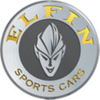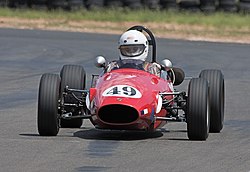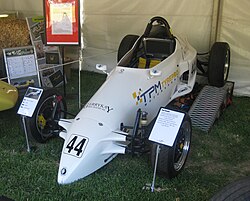Elfin Sports Cars
 | |
| Company type | Private |
|---|---|
| Industry | Automotive |
| Founded | 1959[1] |
| Founder | Garrie Cooper |
| Headquarters | Keysborough, Melbourne, Australia |
Key people | Don Elliott Tom Walkinshaw Shaun Baker Steven Baker Phani Bhogavalli |
| Products | Elfin T5 Clubman Elfin MS8 Clubman Elfin MS8 Streamliner |
| Services | Automobile manufacturing |
| Parent | Young Timers Garage (YTG) |
| Website | www.elfin.com.au |
Elfin Sports Cars Pty Ltd (formerly known as Elfin Sports Cars[1]) is an Australian car manufacturer company that was founded by Garrie Cooper.[2] It has been an Australian manufacturer of sports cars and motor racing cars since 1959.
Elfin Sports Cars is currently owned by Young Timers Garage (YTG) after being purchased by the company in May 2023 from the Walkinshaw Group.[3] It was previously owned by businessmen and historic racing enthusiasts Bill Hemming and Nick Kovatch (who remains as technical director) who purchased it in 1998.
Elfin is the oldest continuous sports car maker in Australia and one of the most successful with 29 championships and major Grand Prix titles.[4] The original factory was located at Conmurra Avenue, Edwardstown in suburban Adelaide, South Australia. The company is currently located in Keysborough, a suburb of Melbourne, Australia.

History
[edit]The company was founded in South Australia as Elfin Sports Cars in October 1959[1] by Garrie Cooper, who would go on to be a champion race driver as well as a successful designer and builder of Elfin racing and sports-racing cars. In 1983, following the death of its founder the previous year, the firm was bought by Tasmanian Don Elliott, racing driver Tony Edmondson and mechanic John Porter who re-established the provision of parts and service to existing owners.[citation needed]
Cooper died suddenly on ANZAC Day (25 April) in 1982, at the age of 46, from a burst aorta, due to the vessel's weakness from medication he took to thin his blood after a mid-1970s heart valve operation. Cliff Cooper, Garrie's father, completed outstanding orders, including six new generation Formula Vees, before offering the business for sale as well as designing a new Formula Vee, the Crusader, and a Formula Brabham car.[5]
In 1993, Victorian Murray Richards acquired Elfin and set out to build a new generation Elfin Clubman called the Type 3. In failing health, he sold Elfin to Bill Hemming and Nick Kovatch in 1998[5] who relocated the business to Melbourne, Victoria.[citation needed]
Elfin subsequently began a collaboration with GM Holden, revealing a concept MS8 Streamliner at the Melbourne International Motor Show in 2004. Limited production of two versions of the MS8 began in March 2006 and after the business was sold to Tom Walkinshaw (of HSV / Walkinshaw Performance) in December 2006, future limited production units were retailed Australia-wide via select HSV dealerships in each state.[citation needed]
Following his death in December 2010, ownership of Elfin remained vested in the estate of Tom Walkinshaw ... but, there has been no further production of any Elfin cars since March 2012.[citation needed]
In May, 2023, Elfin was sold Shaun Baker, Steven Baker and Phani Bhogavalli of luxury car dealer, Young Timers Garage (YTG), located in Keysborough, Victoria. YTG have announced plans to revitalise the brand after it sat dormant for 10 years under the Walkinshaw ownership.[citation needed]
The Elfin Heritage Centre dedicated to Elfin Sports Cars including Garrie Cooper’s first (Cooper Austin) and last (MR9 F5000) race cars, plus the prototype of his planned Formula Vee based road sports car. Opened in Melbourne on 16 August 2007, the centre features 24 current and historic vehicles and is open to the public.[citation needed]
Racing
[edit]Elfin drivers have won 29 championships and major titles including two Australian Drivers' Championships (1973, 1975), four Australian Sports Car Championships (1970, 1973, 1974, 1975), three Australian Tourist Trophies (1966, 1976, 1978), and four Australian Formula Ford Series (1970, 1971, 1974, 1982). In addition Elfin cars also won the Singapore Grand Prix (1968), the Malaysian Grand Prix (1968, 1969, 1972), and the New Zealand Grand Prix (1973, 1974).
Drivers of Elfin cars included 1976 Formula One World Champion James Hunt, and French F1 driver, Didier Pironi. Others included Australian F1 drivers Vern Schuppan and Larry Perkins, as well as John Bowe, Frank Matich, John McCormack, Bob Jane, Allan Grice, Peter Manton and Mark Mclaughlin.
Models
[edit]Recent vehicles
[edit]In 2006, Elfin began producing two related V8-powered sports cars : the MS8 Streamliner and the MS8 Clubman. Thereafter, in 2008, Elfin introduced what might be termed an entry-level model, the turbocharged four cylinder T5 Clubman.
Engines for the MS8 cars were essentially standard production 5.7 litre Gen III V8s as supplied to GM Holden for their VZ-series Commodore vehicles. For the T5 Clubman, Pontiac-derived engines were supplied by GM Powertrain (USA).
The MS8 cars have significant power (circa 255kW) for their size and weight, but are infamous for "spirited" handling. Some media regarded the MS8 vehicles as somewhat disappointing, considering Elfin's motorsport history.[6]
Elfin vehicle production was officially in hiatus by March 2012, with ongoing enquiries at that time to be directed to the related Walkinshaw Performance business.
-
Elfin MS8 Streamliner
-
Elfin T5 Clubman
Historic vehicles – Garrie Cooper era
[edit]The original company produced 248 racing and sports racing cars in 27 different models over a 25-year period.
| Model | Total[7] | Production | Description | Image |
|---|---|---|---|---|
| Streamliner | 23 | 1959–1963 | Sports racing car (front engined) | 
|
| Formula Junior & Catalina | 20 | 1961–1964 | Formula Junior racing car & small capacity racing car. The two models differed only in minor specifications and the majority built were Formula Juniors.[7] | 
|
| Clubman | 14 | 1961–1965 | Clubman sports car | 
|
| Mallala | 5 | 1962–1964 | Sports racing car | 
|
| Type 100 Mono | 19 | 1964–1969 | Australian 1½ Litre Formula racing car | 
|
| Type 500 | 21 | 1965–1969 | Formula Vee racing car | 
|
| Type 400 | 4 | 1966–1967 | Group A sports racing car (V8 powered)[8] | 
|
| Type 300 | 6 | 1967–1969 | Sports racing car | 
|
| 600/B/C/D/E | 27 | 1968–1971 | Racing car (various formulae) | 
|
| 600 FF | 17 | 1969–1972 | Formula Ford racing car | 
|
| Type 350 | 1 | 1969 only | Sports racing car | |
| ME5 | 1 | 1969 only | Group A sports racing car (V8 powered) | 
|
| Type 360 | 3 | 1971 only | Sports racing car | 
|
| MR5 | 4 | 1971–1972 | Australian Formula 1 racing car (F5000). The first F5000 car designed and built by Elfin. | 
|
| 620FF / 620B[9] | 20 | 1972–1975 | Formula Ford racing car | |
| 622 | 6 | 1972–1974 | Australian Formula 2 racing car | 
|
| 623 | 8 | 1973–1974 | Australian Formula 3 racing car | 
|
| MR6 | 1 | 1974 only | Australian Formula 1 racing car (F5000) | |
| MS7 | 1 | 1974 only | Sports racing car (V8 powered) | |
| 630 | 2 | 1974–1975 | Australian Formula 2 racing car | 
|
| 700 | 7 | 1975–1977 | Australian Formula 2 racing car | 
|
| MR8 | 3 | 1976–1978 | Australian Formula 1 racing car (F5000) | 
|
| New Generation "NG" | 29 | 1976–1983 | Formula Vee racing car | |
| 792 | 3 | 1979 only | Australian Formula 2 racing car | |
| Aero FF | 1 | 1979 only | Formula Ford racing car | |
| GE Two-25 | 1 | 1980 only | Australian Formula 2 racing car | |
| MR9 | 1 | 1980 only | Australian Formula 1 racing car (F5000). The first open-wheel race car to be designed and built in Australia using ground effect aerodynamics. This remains the only ground effect F5000 car ever constructed.[10] | |
| Total | 248 | |||
Historic vehicles – The post–Garrie-Cooper era
[edit]| Model | Total | Production | Description | Image |
|---|---|---|---|---|
| FF84 | 1 | 1984 | Formula Ford racing car. | |
| NG "EP" | 8 | 1984–1986 | Edmondson-Porter run one of the NG Series Formula Vee racing cars. | |
| Crusader | 20[11] | Circa 1990[12] | Formula Vee racing car. | 
|
| 852 | 1 | 1985 | Australian Formula 2 racing car driven by Mark Mclaughlin. | |
| FA891 | 1 | 1989 | Formula Holden racing car fielded in the 1989 Australian Drivers' Championship by Elfin Sports Cars driven by Mark Mclaughlin. Follow up orders from competitors were not forthcoming, largely preferring to import the latest British designs from Lola, Ralt and Reynard. The FA in FA891 was for the category's original working name, Formula Australia. | |
| Type 3 Clubman | 70[11] | 1998–2007 | Clubman sports car.[13] Powered by a supercharged Toyota 4AG ZE engine.[13] | 
|
See also
[edit]References
[edit]- ^ a b c South Australia - Certificate of Registration of a Business Name, Elfin Sports Cars, 19 October 1959
- ^ Dowsey, David. "Elfin: The Spirit of Speed". Elfin Heritage Centre, 2020.
- ^ Aaron Noonan, Elfin Sold by Walkinshaw Group, 26 May 2023, www.v8sleuth.com.au, as archived at web.archive.org
- ^ Round, Jason. "Going for gold". HOT4s. Archived from the original on 3 September 2007. Retrieved 12 March 2007.
- ^ a b "Elfin Sports Cars – The Perfect Classic? – Australian Classic Car". Elfin.com.au. Archived from the original on 6 July 2011. Retrieved 4 October 2010.
- ^ "Elfin MS8 review, specs, stats, comparison, rivals, data, details, photos and information on SupercarWorld.com". www.supercarworld.com. Retrieved 10 February 2020.
- ^ a b John Blanden & Barry Catford, Australia's Elfin Sports and Racing Cars, 1997
- ^ Bissett, Mark (28 May 2015). "Elfin 400/Traco Olds: Frank Matich, Neil Allan and Garrie Cooper". primotipo.com. Retrieved 30 April 2016.
- ^ ELFIN SPORTS CARS, www.shannons.com.au Retrieved 25 June 2016
- ^ Old Racing Cars – Elfin
- ^ a b "Celebrate with Elfin". Shannons.com.au. 30 October 2008. Retrieved 4 October 2010.
- ^ The Formula Vee Story, www.terrywalkersplace.com Retrieved 29 September 2015
- ^ a b Elfin Clubman Type 3 advertisement, CAMS Magazine, Autumn 2003, page 21



